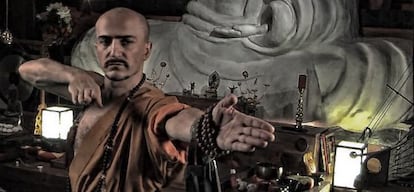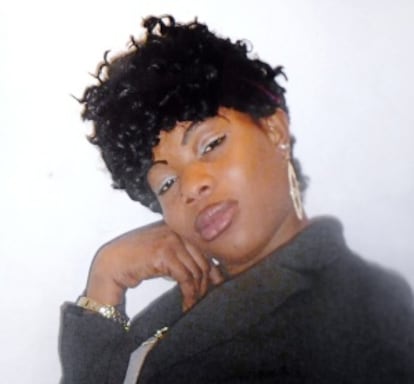Can Bilbao’s kung fu killer be held responsible for his actions?
Bogus Shaolin monk Juan Carlos Aguilar faces life in prison for the slaying of two women in 2013

The trial of Juan Carlos Aguilar, the bogus kung fu master who murdered two women in Bilbao last year, is due to begin this fall. Basque Country regional police say that Aguilar, who has refused a psychiatric examination, is mentally fit to appear before the court.
However, in 2010 Aguilar was diagnosed with a cyst on his left temporal lobe, which can affect memory and behavior, and was treated with pharmaceuticals. Aguilar has repeatedly referred to the “tumor” in his statements to police, saying that it produced rage attacks.
The first of the two murders to which Aguilar has confessed took place on May 25, 2013. In the early hours of that morning, he picked up Yenny Sofía Revollo Tuirán, a 40-year-old single mother with two children, in the center of Bilbao. He then took her to his gym on Máximo Aguirre street, where he tied her up and then killed her. Police say he took photographs of himself with the victim’s naked body, which he then dismembered, removing fingerprints and her breast implants. Part of the remains were scattered in garbage bins or thrown into the river that runs through the city, some pieces he burnt, and others were stored in his apartment and in the gymnasium.
In 2010 Aguilar was diagnosed with a cyst on his left temporal lobe, which can affect memory and behavior
A week later, Aguirre returned to the center of Bilbao, and in the early hours of June 2, picked up Maureen Ada Otuya, a 29-year-old Nigerian woman, and took her to his gym. After having sex with her, he then tied and gagged his victim and for the next nine hours repeatedly beat and tortured her. Finally, at 3pm, she was able to reach a window, from which she called for help.
When police arrived, they found Aguirre covered in blood, and Otuya unconscious. She died two days later. After searching the premises, police found several bags containing the remains of Revollo Tuirán, along with a variety of weapons, as well as pornographic videos and photographs.

Police later discovered that Aguirre maintained a series of relationships with several female students. One, Ana, told police that she was Aguirre’s novice, and that he had “taught her what life is about.”
The police discovered that Aguirre was often violent to the women he had relationships with. One woman described him as “arrogant, manipulative, and selfish” and that he ran the gym “like a sect.”
José Miguel Fernández López de Uralde, the lawyer representing the father and brother of Otuya, say that Aguirre “enjoyed having sadistic sexual relations with defenseless women, beating them and then taking photographs.” Police say that they discovered photographs of a naked woman who had been bound and blindfolded standing in front of the body of Revollo Tuirán. Initially, the police believed that Aguirre might have murdered other women.
When I realized she was dead, I tried to get rid of her. I had a sense of reality mixed with loss of control”
“We came across this killer by chance,” said a member of the team investigating the case last year. “It was not the result of an investigation. In that case we would have been under intense pressure in the knowledge that there was a killer out there and that we had to track him down. We are calm because he is in custody and cannot kill anyone else, but we have to look into his past and find out when he first killed and whether he did so on more occasions.”
Police have tried to build up a picture of Aguilar’s life since 1994 when he returned from China, where he claims to have trained at the Shaolin Temple in Henan province. Aguilar’s 20-year career in martial arts seems to have been a largely commercial venture, rather than a spiritual one.
In 1996, after failing to set up a Shaolin franchise in Berlin, he focused his energy on becoming the official representative of the order in Spain. By the late 1990s, his business was flourishing and he became a familiar face on television and in newspapers and specialist magazines. But former pupils say he demanded obedience and money from those who had trained under him and sought to go their own way. By now, he had changed his name to Huang C. Aguilar and began styling himself as a Shaolin master.
But the Shaolin Temple Spain, the only center in the country recognized by the Shaolin Temple in China, has confirmed that Aguilar is neither a Shaolin master nor a monk. Shi Fu Carlos Álvarez, a master and instructor at Shaolin Temple Spain, said that Aguilar “lacks all of the requisites to be a monk. Unfortunately, many Chinese certificates are obtained in an irregular manner,” he added.
Aguilar’s 20-year career in martial arts seems to have been a commercial, rather than spiritual, venture
Aguilar now faces two 25-year murder sentences, and from his comments to police, could be looking to reduce his sentence by claiming some kind of diminished responsibility on medical grounds. He has repeatedly referred to the cyst on his brain when talking to the police, saying that in December 2008, while on a climbing expedition at 5,500 meters, he was overcome by a feeling of imminent death. “From that day on, my thinking has slowed down, I lose my train of thought, and it feels as though my brain is stopping.”
He told police that his first victim began to “rave” when he took her back to the gym, causing him to suffer “an attack of uncontrolled rage” due to the “tumor” on his brain. “When I realized that she was dead, I tried to get rid of her. I had flashes of perception, and a sense of reality mixed with loss of control. This has been going on for four years.”
Jorge García-Gasco Lominchar, the lawyer representing Revollo Tuirán’s brother and one of her children, describes Aguilar as “messianic.” But he argues that Aguilar committed the crimes to which he has admitted because he lost control, not his mind, and that the cyst on his brain had nothing to do with his actions. Tamara Martínez, the lawyer representing a private prosecution on behalf of the Clara Campoamor women’s group, also dismisses the idea that Aguilar is in any way mentally unfit to stand trial. “He is very clever, very calculating, and very manipulative. He knows how to connect with people, and took advantage of his reputation and television appearances,” says Martínez.
Francisco Javier Beramendi, Aguilar’s lawyer, has refused to comment on whether he will be defending his client on medical grounds. “I never talk about my cases, and so far there has been no definitive resolution here,” he said.
Tu suscripción se está usando en otro dispositivo
¿Quieres añadir otro usuario a tu suscripción?
Si continúas leyendo en este dispositivo, no se podrá leer en el otro.
FlechaTu suscripción se está usando en otro dispositivo y solo puedes acceder a EL PAÍS desde un dispositivo a la vez.
Si quieres compartir tu cuenta, cambia tu suscripción a la modalidad Premium, así podrás añadir otro usuario. Cada uno accederá con su propia cuenta de email, lo que os permitirá personalizar vuestra experiencia en EL PAÍS.
¿Tienes una suscripción de empresa? Accede aquí para contratar más cuentas.
En el caso de no saber quién está usando tu cuenta, te recomendamos cambiar tu contraseña aquí.
Si decides continuar compartiendo tu cuenta, este mensaje se mostrará en tu dispositivo y en el de la otra persona que está usando tu cuenta de forma indefinida, afectando a tu experiencia de lectura. Puedes consultar aquí los términos y condiciones de la suscripción digital.








































